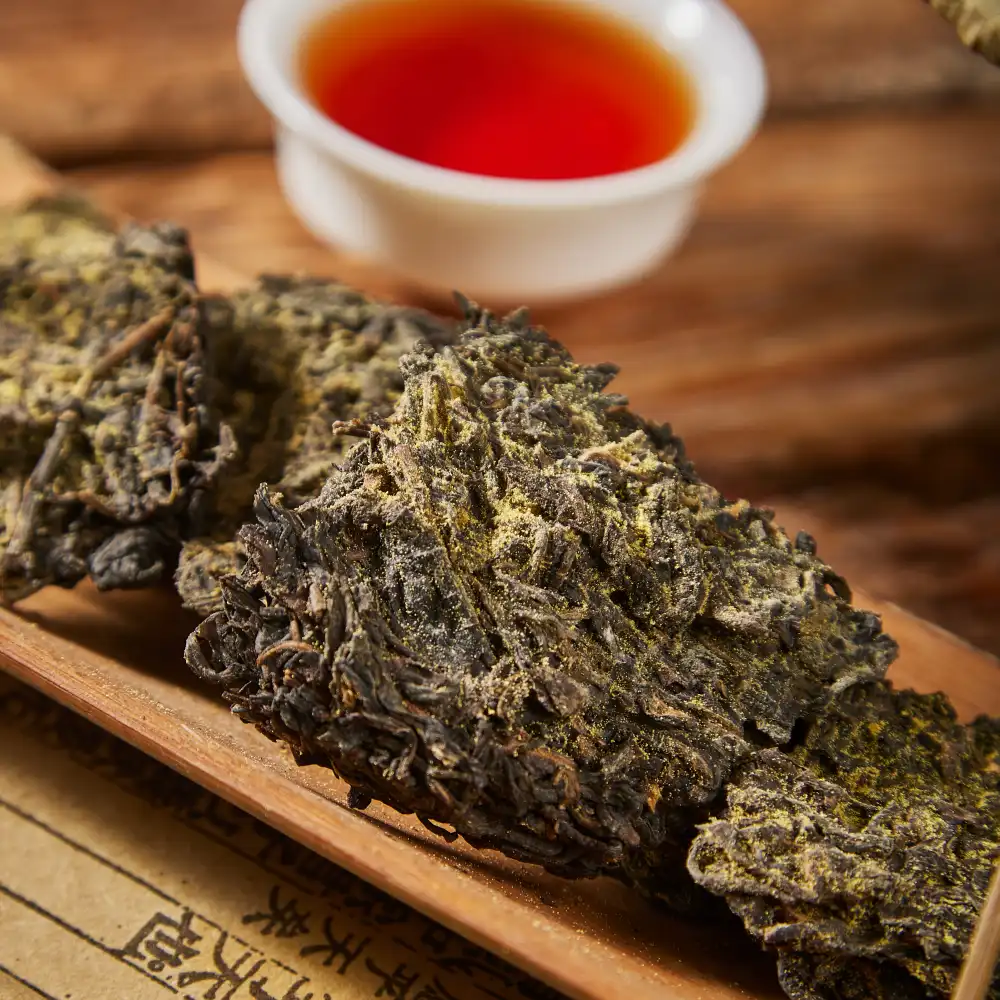Fuzhuan tea, also known as Fuzhuan brick tea, is a unique and flavorful refreshment enjoyed in China for centuries. This dark tea, tracing back to the Jingyang region of the Qinling Mountains, is famous for its unmistakable taste and health benefits. As tea enthusiasts investigate the world of Fuzhuan tea, numerous are inquisitive about how to best appreciate it with nourishment. In this article, we’ll dig into the craftsmanship of blending Fuzhuan brick tea with different cuisines, investigating the do’s and don’ts to improve your tea-drinking encounter.
Grasping the Flavor Profile of Fuzhuan Tea
Before we jump into nourishment pairings, we must learn the unique characteristics of Fuzhuan tea. This matured tea is known for its profound, natural flavor with clues of sweetness and a smooth, mellow finish. The fermentation process gives a complex taste profile that can incorporate notes of wood, mushrooms, and a slight smokiness.
Fuzhuan brick tea is often described as having a “golden flower” appearance due to the presence of Eurotium cristatum. This beneficial fungus grows on the tea during the fermentation process. This fungus contributes to the tea’s health benefits and unique flavor profile.

The robust nature of Fuzhuan tea makes it an excellent candidate for food pairings. Still, it’s essential to choose complementary flavors that won’t overpower or clash with the tea’s distinctive taste.
Ideal Food Pairings for Fuzhuan Brick Tea
When pairing Fuzhuan tea with food, several excellent options can enhance both the tea and the meal. Here are some ideal pairings to consider:
| Food Category | Ideal Pairings |
|---|---|
| Rich, Savory Dishes | Braised beef or pork, Roasted duck, Hearty stews, Grilled mushrooms |
| Spicy Foods | Sichuan hot pot, Spicy Hunan dishes, Mapo tofu, Curry dishes |
| Dim Sum and Light Bites | Steamed dumplings, Spring rolls, Vegetable stir-fries, Light seafood dishes |
| Aged Cheeses | Aged cheddar, Gouda, Parmesan, Blue cheese |
| Desserts | Dark chocolate, Nutty pastries, Fruit tarts (especially with berries or stone fruits), Mildly sweet rice-based desserts |
Rich, Savory Dishes: The earthy, full-bodied flavor of Fuzhuan tea pairs exceptionally well with rich, savory foods. Consider enjoying your tea with dishes like:
- Braised beef or pork
- Roasted duck
- Hearty stews
- Grilled mushrooms
Spicy Foods: Fuzhuan tea’s smooth, mellow nature makes it an excellent companion to spicy cuisine. The tea can help soothe the palate and balance out the heat. Try pairing it with:
- Sichuan hot pot
- Spicy Hunan dishes
- Mapo tofu
- Curry dishes
Dim Sum and Light Bites: The versatility of Fuzhuan brick tea allows it to pair well with lighter fare, too. Consider enjoying it with the following:
- Steamed dumplings
- Spring rolls
- Vegetable stir-fries
- Light seafood dishes
Aged Cheeses: The fermented nature of Fuzhuan tea makes it an unexpected but delightful pairing with aged cheeses. Try it with:
- Aged cheddar
- Gouda
- Parmesan
- Blue cheese
Desserts: While Fuzhuan tea isn’t typically associated with sweets, it can pair surprisingly well with sure desserts. Consider:
- Dark chocolate
- Nutty pastries
- Fruit tarts (especially with berries or stone fruits)
- Mildly sweet rice-based desserts
Food Pairings to Avoid with Fuzhuan Tea
| Food Category | Foods to Avoid |
|---|---|
| Citrus and Highly Acidic Foods | Citrus fruits or juices, Tomato-based dishes, Vinegar-heavy salad dressings, Pickled foods |
| Delicate Fish or Seafood | Raw fish dishes like sashimi, Lightly seasoned white fish, Mild shellfish like scallops |
| Very Sweet Desserts | Sugary cakes or pastries, Ice cream, Candy, Syrup-heavy desserts |
| Potent Herbs and Spices | Mint, Cilantro, Garlic, Strong curry spices |
| Milk-based Dishes | Creamy pasta dishes, Milk-based soups, Dishes with heavy cream sauces |
While Fuzhuan brick tea is versatile, some food pairings are best avoided to ensure the best tasting experience:
Citrus and Highly Acidic Foods: The acidity in these foods can clash with the tea’s earthy flavors, creating an unpleasant taste. Avoid pairing Fuzhuan tea with:
- Citrus fruits or juices
- Tomato-based dishes
- Vinegar-heavy salad dressings
- Pickled foods
Delicate Fish or Seafood: The robust flavor of Fuzhuan tea can overpower the subtle tastes of delicate fish or seafood. It’s best to avoid pairing with:
- Raw fish dishes like sashimi
- Lightly seasoned white fish
- Mild shellfish like scallops
Very Sweet Desserts: While some desserts can pair well with Fuzhuan tea, overly sweet treats can clash with the tea’s flavor profile. Steer clear of:
- Sugary cakes or pastries
- Ice cream
- Candy
- Syrup-heavy desserts
Potent Herbs and Spices: Certain bold herbs and spices can overwhelm the nuanced flavors of Fuzhuan tea. Avoid dishes heavy in:
- Mint
- Cilantro
- Garlic
- Strong curry spices
Milk-based Dishes: The creamy nature of milk-based foods can mute the flavors of Fuzhuan tea. It’s best to avoid pairing with:
- Creamy pasta dishes
- Milk-based soups
- Dishes with heavy cream sauces
Tips for Optimal Fuzhuan Tea Pairing
| Tip | Details |
|---|---|
| Temperature Matters | Hot tea pairs well with hot dishes, while room-temperature tea complements cold or room-temperature foods. |
| Brewing Strength | A milder brew suits lighter dishes, while stronger brews work better with more robust flavors. |
| Time of Day | Fuzhuan tea is ideal for morning or midday. Lighter pairings are better earlier, with heavier pairings for lunch or dinner. |
| Cultural Context | Pairing Fuzhuan tea with traditional Chinese dishes can enhance the authenticity and harmony of the meal. |
| Personal Preference | Experiment with different pairings to find what suits your individual taste. |
To make the most of your Fuzhuan brick tea and food pairings, consider these additional tips:
Temperature Matters: Fuzhuan tea is typically enjoyed hot or at room temperature. When pairing with food, consider the temperature of your dish. Hot tea pairs well with hot dishes, while room-temperature tea can be a refreshing accompaniment to cold or room-temperature foods.
Brewing Strength: The strength of your brew can affect how well it pairs with food. A milder brew might be preferable for lighter dishes, while more potent brews can withstand more robust flavors.
Time of Day: Fuzhuan tea can be enjoyed throughout the day, but its robust nature makes it particularly suitable for morning or midday consumption. Consider lighter pairings earlier in the day and more substantial ones for lunch or dinner.
Cultural Context: Remember that Fuzhuan tea has a rich cultural history in China. Pairing it with traditional Chinese dishes can create an authentic and harmonious dining experience.
Personal Preference: While these guidelines can be helpful, personal taste always plays a role. Don’t be afraid to experiment with different pairings to find what you enjoy most.
Conclusion
Pairing Fuzhuan brick tea with food can be an exciting culinary adventure. You can create memorable and delicious combinations by understanding the tea’s unique flavor profile and following these do’s and don’ts. Whether you’re enjoying a rich, savory meal or a light snack, a Fuzhuan tea pairing can enhance your dining experience. So, brew this remarkable tea, prepare your favorite dishes, and embark on a flavorful exploration of Fuzhuan brick tea pairings.
We serve thousands of satisfied tea enthusiasts in our tea house each year, and we’re excited to share these exceptional teas with tea lovers worldwide at Orientaleaf.com.

Ready to experience the Fuzhuan tea with your favorite food? Below, we’ve listed our premium Fuzhaun Brick tea collection to elevate your tea experience. Feel free to explore and make your selection!
References
- Zhang, L., et al. (2013). “Fuzhuan Brick Tea: A Review on the Traditional Processing Method and Scientific Research Progress.” Journal of Food Science and Technology, 50(6), 1061-1070.
- Xie, M., et al. (2019). “A Review of the Bioactive Compounds and Health Benefits of Fu Brick Tea.” Journal of Traditional and Complementary Medicine, 9(3), 205-215.
- Liu, Z., et al. (2018). “The Chemistry of Fuzhuan Brick Tea.” Food Chemistry, 244, 109-118.
- Xu, Y., et al. (2015). “Fungal Diversity in Fuzhuan Brick Tea and Their Influence on Taste and Aroma.” Food Research International, 78, 64-72.
- Wang, Q., et al. (2016). “Flavor Chemistry of Chinese Dark Tea and Its Correlations with Sensory Attributes.” Journal of Agricultural and Food Chemistry, 64(43), 8142-8151.


